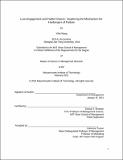Low engagement and failed choices : exploring the mechanism for harbingers of failure
Author(s)
Wang, Yifei(Business management scientist)Massachusetts Institute of Technology.
Download1251804755-MIT.pdf (871.1Kb)
Alternative title
Exploring the mechanism for harbingers of failure
Other Contributors
Sloan School of Management.
Advisor
Duncan I. Simester.
Terms of use
Metadata
Show full item recordAbstract
Previous research has documented the existence of 'harbingers of failure', who systematically purchase new products that fail. This paper proposes an explanation for the harbinger effect. We establish consumer engagement in decision making as one mechanism for the harbinger effect using evidence from multiple studies. We show that harbingers are less engaged in purchasing decisions. Harbinger customers identified from in-store purchases browse fewer pages and spend less time searching for information when purchasing a product online. They are also more likely to purchase products that customers who engage in more effort will not buy. Their low level of engagement extends to post-purchase scenarios: harbinger customers are less likely to write online reviews, and when they do write reviews, their reviews are significantly shorter than other customers. We then ask whether low engagement has a causal impact on high flop rates observed in harbingers. We identify the causal effect by exploring exogeneous variations in consumer engagement due to changes in hourly store traffic in an offline shopping environment. Using a fixed effect model, we show that increases in store traffic lead to significant increases in the proportion of failed products purchased by customers visiting the store. We confirm that store traffic influences flop rate through consumer engagement by investigating categories where consumer engagement is more vs. less responsive to changes in store traffic. We show that the effect of store traffic on consumer flop rate is more prominent in categories where higher traffic has a larger negative impact on consumer search and engagement. Collectively, our results demonstrate that harbinger customers tend to be less engaged in making decisions, and that their low level of engagement causes them to purchase failed products and make unpopular choices.
Description
Thesis: S.M. in Management Research, Massachusetts Institute of Technology, Sloan School of Management, February, 2021 Cataloged from the official PDF version of thesis. Includes bibliographical references (page 28).
Date issued
2021Department
Sloan School of ManagementPublisher
Massachusetts Institute of Technology
Keywords
Sloan School of Management.